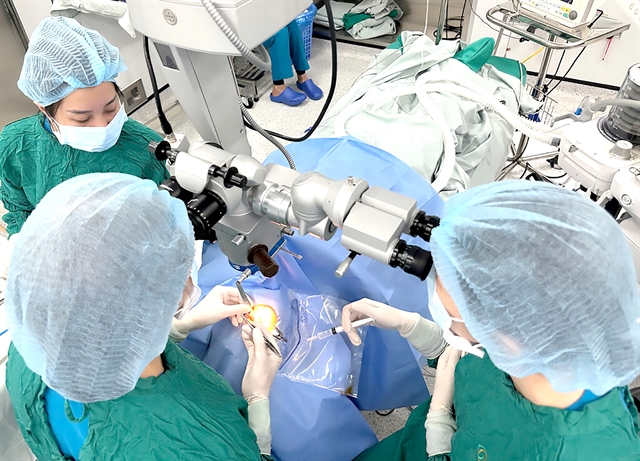 |
| Doctors performing the corneal transplant for the patient N.T.V., who had to wait for a long time due to the scarcity of corneas in the hospital's Tissue Bank. VNA/VNS Photo Đức Tâm |
The recipient, N.T.V. from Thái Nguyên, was blind in both eyes for ten years due to hereditary corneal dystrophy.
Due to the scarcity of corneas in the Tissue Bank, she had to wait a long time, depending heavily on others for daily activities.
The corneal transplant lasted about 45 minutes and showed promising initial results, with the recipient regaining 1/10 vision. She can now walk independently.
N.T.V.'s donor was a 75-year-old woman who passed away at 5.18am on September 25. Her son, a military doctor, expressed his wish to donate his mother’s corneas. Hà Nội Eye Hospital 2's Tissue Bank got a call informing them of a son who wished to donate his mother’s corneas to help the blind see again. The Tissue Bank's team quickly mobilised and travelled to the location to retrieve the corneas.
Thủy Dương, an official from the Tissue Bank at Hà Nội Eye Hospital 2, recalled that the donor's son stood quietly in the corner, observing throughout the procedure. He approached only after the corneas were retrieved, placing his hand on his mother’s hair, embracing her, and breaking down in tears. He held his mother one last time, knowing her corneas would bring light to others.
The corneas were successfully transplanted to two patients, one at Hà Nội Eye Hospital 2 and another at Military Hospital 103.
At her follow-up visit four days after the surgery, V. was moved to tears when the bandages were removed, and she could see again after more than 10 years of blindness.
"For the past 10 years, I could only see vague light and had difficulty moving around. I couldn’t even imagine how my loved ones’ faces had changed over the years," she said.
V. described her experience with emotion: "It truly felt like a miracle had happened to me. When I was informed that a cornea had become available for me, I was so nervous that I couldn’t sleep. Even when I was on the operating table, it still felt like a dream after waiting for thousands of days without a cornea."
After waking up from the surgery, V. felt a rush of excitement, despite being slightly groggy.
"When the doctor asked me to open my eyes, I was overjoyed because I had only seen blurry light, no faces for over ten years. Now, I could clearly see everyone around me. I’m beyond happy, and all I want is to return home and see my family’s faces again. I’m deeply grateful to the person who gave me this gift of sight, and I will do my best to take care of the eyes that were donated to me," said V.
Hoàng Minh Châu, the Chairman of the Medical Council at Hà Nội Eye Hospital 2, explained that while the current results are promising, the patient’s condition will need to be monitored regularly with frequent follow-ups. The patient must adhere strictly to medical advice regarding diet and daily activities, avoiding strenuous activity and protecting the eyes from environmental hazards like dust and impacts.
Châu emphasised that the need for organ and tissue donations, particularly corneas, remains high in Việt Nam, while the availability of donors is limited. A single brain-dead donor can provide the gift of sight to two blind individuals. He urged the public to spread awareness of the importance of cornea and organ donations to continue providing opportunities for those in need.
Việt Nam has a high demand for corneal transplants due to various causes like congenital defects, injuries, burns and infections. However, cornea donations remain scarce due to cultural, psychological and legal barriers.
Statistics indicate that over 30,000 people in Việt Nam suffer from corneal-related blindness, waiting for transplants to restore their sight. Most of the patients waiting for corneal transplants are aged between 30 and 60, although some patients are children.
Since the first cornea donation in April 2007 by Nguyễn Thị Hoa from Ninh Bình, there have been 963 recorded cornea donations nationwide, with Ninh Bình and Nam Định provinces leading in donations. Corneas can only be retrieved after death, and the optimal window for collection is 6-8 hours post mortem.
Anyone, regardless of age or gender, can donate their corneas after death. Even those with poor vision, cancer or diabetes can donate their corneas. VNS